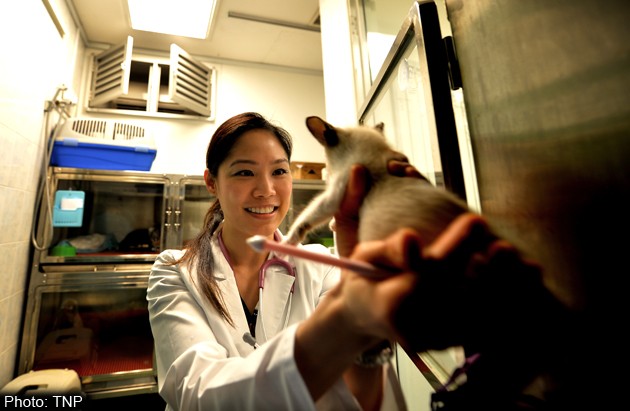Former beauty queen says she comes across bizarre cases treating animals

Animals eat the strangest things.
Dr Cheryl Tay has treated dogs who have made themselves ill thanks to eating sanitary pads and G-strings.
Or in one particularly memorable case, a 1.5 carat diamond engagement ring.
Says Dr Tay: "The couple came home to find items from her dressing table on the floor, but they couldn't find her ring. When their labrador came in for an X-ray, it all made sense.
"Thankfully, the dog eventually passed the ring out. The owner had to look for it in its poop every day," she says with a laugh.
Some readers may recognise Dr Tay as a former Miss Singapore Universe. Dr Tay, who took the crown in 2005, has been working as a veterinarian for 10 years.
While clients occasionally recognise her from her pageant days, they usually resist the temptation to ask for a photo.
"But they sure are enthusiastic about taking photos of their pets, even if they are on the examination table," she says, with a chuckle.
Now in her early 30s, she is the director of medicine and veterinary surgeon at the Animal Recovery Veterinary Referral Centre in Serangoon Road.
She has also treated exotic animals during her time overseas, including skinks (a type of lizard) and axolotls (a type of salamander).
Once, she even had to remove a bullet from a cockatoo's chest while she was working in Australia.
"I'm not sure how it got shot, but the bird was brought in by a concerned member of the public . It may have been an accident."
Despite her experience, Dr Tay confesses that it is always difficult witnessing animals die.
"I can usually keep it together enough to speak to the owners as many have questions about the cause of death and options for cremation.
"But it's always difficult, especially when owners are crying, so I excuse myself quickly to go into the next room for a good sob and only return when I'm calmer," she says.
Dr Tay has seen first-hand how hard pet owners take the loss of their loyal companion.
She remembers a woman who "wailed the hospital down" while dealing with the loss of her pet.
To cope with the grief, another client continued to visit the staff four times a week. Gentleness and patience, says Dr Tay, are key.
"The emotional tension is high, because they treat their pet as a baby for the whole of the animal's life."
Dr Tay knew she wanted to be a vet early on in life. At the age of nine, the opportunity to ride led to a deep love of horses.
Her family also loved dogs.
"We always had dogs. At one point, we had six or seven of them. My aunts also rescued mongrels," she says.
Having worked in the US and Australia, she considers Singapore pet owners as some of the most devoted in the world.
"Some of them love their pets so much they do everything prescribed to a T, even if it means climbing out of bed at unearthly hours to give their pet a pill.
"Others come in with timetables and charts for eye drops that they have to administer at home," she says.
Dr Tay, who is pursuing her masters in small animal medicine, says she has a soft spot for cats, simply because they tend to have an amazing turnaround.
"I've treated cases brought in by rescue groups, where the cat may have jumped out of the window more than 20 storeys high, or it got hit by a car," she says.
"Sometimes, just when you think they aren't going to make it, they pull through.
"To be part of that healing process is very satisfying."
One aspect of the job she really enjoys is performing eye surgery. Her reasons may sound strange to the lay person.
"It's precise, neat and pretty. I also enjoy reconstructive surgery because I love watching wounds heal."
Surprisingly, for a lifelong lover of animals, Dr Tay has only one pet - a 12-year-old terrier.
Long hours at the hospital mean she does not have time for more.
"It takes a lot of effort. You've got to spend time to properly train them, especially when they're young," she explains.
This is not a job without sacrifices.
It is not uncommon for her to crawl out of bed at 3am to attend to an after-hours consultation.
Even when she is off-duty, she often cannot resist returning to the hospital, just to make sure her patients are doing well.
But while being around animals all the time is a definite plus, Dr Tay cautions prospective vets to be prepared to be splattered with pee and vomit while at work.
And of course, while you may love animals, the feeling may not be mutual.
Dr Tay brushes away this reporter's concern at a nasty-looking scratch on the inside of her wrist, courtesy of a cat.
"It's all part of the job," she says.
Secrets of the trade
Manicures are no-nos in this line but always keep hand cream near. You will be scrubbing your hands a lot before surgery, which makes them dry.
Keep upgrading your skills and knowledge. Knowing there is more you can do for your patients is great motivation.
Having a logical head really helps.Remember you cannot save every life, but there are many things you can do to improve a dying animal's quality of life.

This article was first published on Oct 5, 2014.
Get The New Paper for more stories.